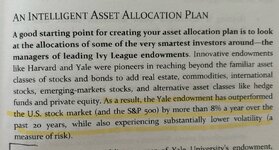Not to derail the OP's thread. But I have been battling with Edward Jones for over a year trying to get my money put into what I want. It's in a 401k, they call it a "simple IRA". I wanted it to be 50/50 in the SPY and QQQ. Not allowed to do that. I am required to have at least 4 different positions. And they must have atleast 20% in each of these categories. Small cap, mid-cap, large cap and international.
Frustrating doesn't even describe this. They tell me that they have me invested for the "long haul, not get rich quick" they say "you are invested in "good, safe growth stocks". But when you have them look up a chart of the SPY and QQQ they either aren't smart enough or don't care to see how much the SPY and QQQ have out preformed thier normal crap they have me in. Thier international stock I am in has something like a 7% growth over a 5yr period. That's not 7% annually, it's over the whole 5yrs. Imagine 20% of your account being in something that has growth 7% in 5yrs

They don't know it yet but they are losing my account Jan 1st

